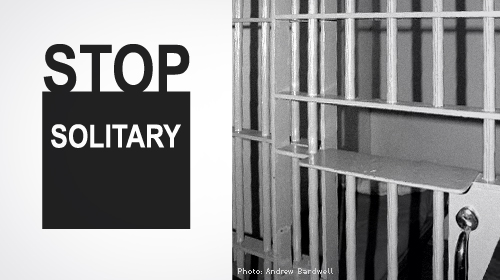Rights Groups to Government: Allow U.N. Torture Expert to Examine U.S. Use of Solitary Confinement


Human and civil rights groups around the country have asked the U.S. government to invite a U.N. expert to visit the United States to examine, among other things, the practice of solitary confinement. Juan MĂ©ndez, the U.N. special rapporteur on torture, has repeatedly asked the U.S. government to extend such an official invitation, but his requests have thus far gone unanswered.
Méndez is a former Argentinian political prisoner and respected human rights lawyer who once served as president of the Inter-American Commission on Human Rights. In a presented last year to the United Nations (U.N.) Human Rights Council, Méndez found that solitary confinement can amount to cruel, inhuman, or degrading treatment or punishment – and even torture. He has repeatedly called for the absolute prohibition of solitary confinement of children and persons with mental disabilities, and recommended the implementation of alternative disciplinary sanctions. He has also called for increased safeguards and the universal prohibition of prolonged solitary confinement (exceeding 15 days).
As the special rapporteur recently reported to the Inter-American Commission, on any given day over 80,000 people are held in solitary confinement in prisons and jails in the United States, and more than 25,000 of them are held in so-called "supermax" prisons specifically designed for long-term solitary confinement. Despite Mr. MĂ©ndez's multiple requests to investigate the over-use of solitary confinement in the United States, the U.S. has, to date, failed to extend him an invitation.
Imagine if China or Russia refused to engage with independent human rights experts and provide them access to places of detention. What would the U.S. government response be? Certainly nothing short of protest and condemnation. For example, in 2011, the U.S. "to allow access to the U.N. Special Rapporteur and the International Red Cross to its jails so that a fuller accounting of remaining political prisoners can be possible."
Americans should be outraged over this double standard. Indeed, there is broad support for allowing human rights experts to investigate rights abuses. According to a from 2008, 70 percent of Americans said they believe the U.N. should actively promote human rights in member states – 75 percent favored "giving the U.N. the authority to go into countries in order to investigate violations of human rights." Three other conducted between 2006 and 2010 found that over 70 percent support the principle.
So why won't the U.S. grant the special rapporteur access to the United States? Are we hiding something? Don't we only benefit by engaging with a human rights expert who might have some good advice about how to deal with this pervasive human rights issue, especially its use against juveniles, people with mental disabilities, and other vulnerable populations? U.S. leadership on the world stage suffers when we seem to present a double standard on human rights; the U.S. government shouldn't selectively ignore human rights violations at home or abroad. As Senator Lindsey Graham about solitary confinement, "American values are on display when you have the power to confine someone. It says a lot about who we are as a nation." It's time to be transparent.
So this week, over 50 civil and human rights groups are calling on the U.S. to take a step toward reversing the double standard by granting Mr. MĂ©ndez an official invitation to, among other things, examine the problem of solitary confinement. The coalition's letter says:
As a crucial step toward addressing the overuse and abuse of solitary confinement in this country, to fulfill commitments made by the U.S. government to support the work of the U.N. Special Rapporteur on Torture, and to promote greater transparency and accountability regarding the human rights record of the United States, we urge you to extend an invitation to the Special Rapporteur on Torture, Professor Juan MĂ©ndez, to undertake fact-finding in the United States, in accordance with the Terms of Reference for Fact-Finding Missions by UN Special Rapporteurs, on this most pressing human rights issue.
While the Obama administration took the commendable step of joining the Human Rights Council, it has yet to fully honor key commitments it made when it joined, such as supporting U.N. independent human rights experts. This includes hosting visits like that which Mr. Méndez has requested. While the U.S. has extended invitations and facilitated visits by other U.N. special rapporteurs, the administration has not fully implemented their recommendations. When the U.S. was re-elected to the council, the Obama administration to "support… the work of the U.N. Special Rapporteur on Torture." We hope that this administration decides to put words into action when it comes to cooperation with human rights bodies and implementation of international commitments. An important step in this direction would be to extend an invitation to Mr. Méndez and grant him access to detention facilities as appropriate under U.N. protocols.
Learn more about solitary confinement and other civil liberty issues: Sign up for breaking news alerts, , and .

